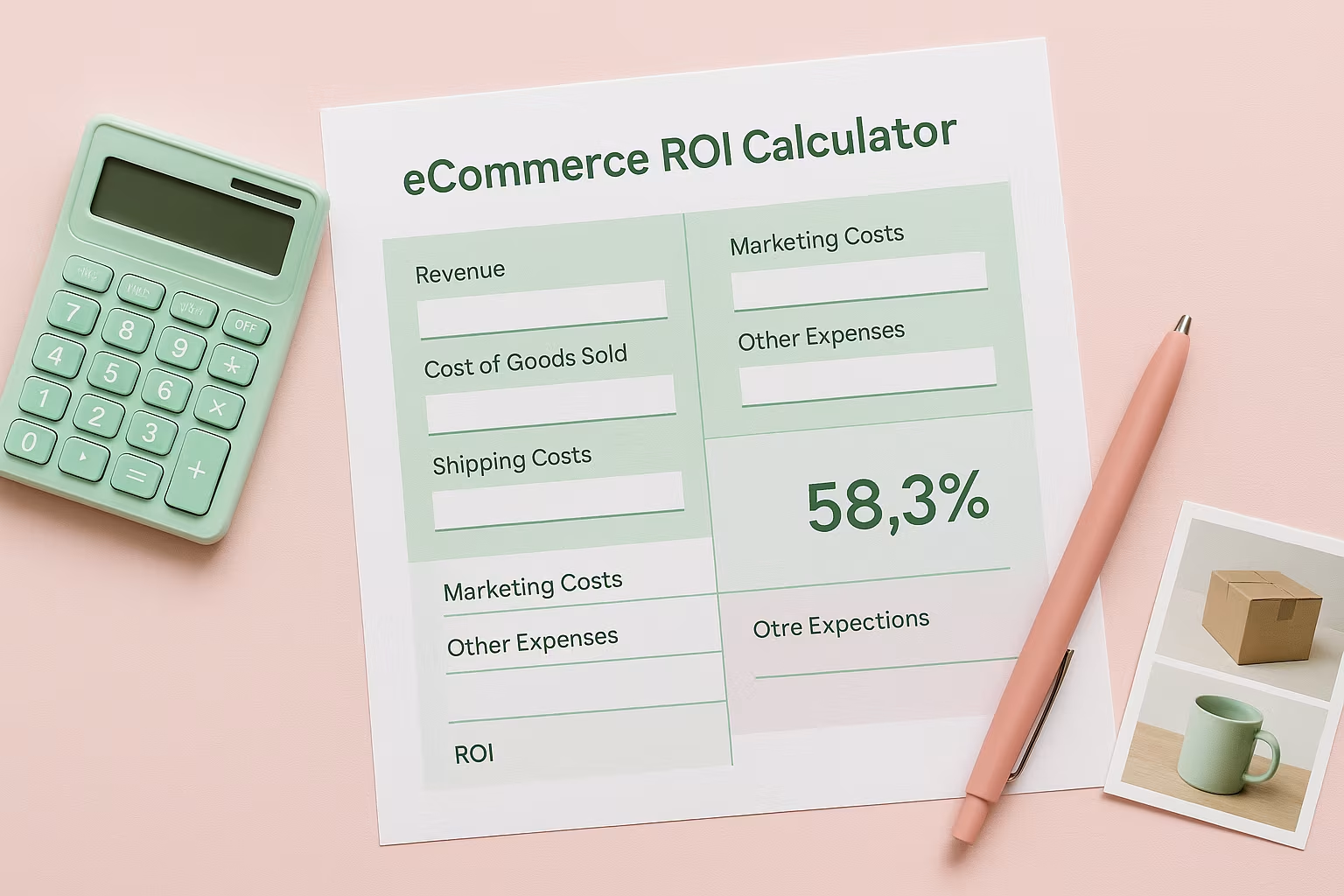
The nootropics market has exploded in popularity as consumers seek cognitive enhancement solutions. Valued at over USD 11.6 billion in 2022, it's expected to reach USD 29.2 billion by 2030.
But with this rapid growth comes a pressing concern for entrepreneurs: Is selling nootropics legal? The answer depends on the compounds used, your location, marketing practices, and regulatory compliance.
Before diving in, it’s essential to unpack the question: Is it legal to sell nootropics? Global laws vary, and the distinction between supplements and pharmaceuticals can be murky.
Understanding these legal grey areas is vital for anyone eyeing this booming industry. A clear grasp of regulations helps avoid costly missteps from the start.
The Legalities of Selling Nootropics: Regulatory Requirements
To operate a legitimate nootropics business, several regulatory requirements must be met, regardless of your location.
FDA Compliance and Dietary Supplement Regulations
If you're selling nootropics as dietary supplements in the U.S., you must comply with FDA regulations:
- Good Manufacturing Practices (GMPs): All supplements must be produced in facilities that follow GMPs to ensure product quality and consistency.
- Labeling Requirements: Supplement labels must include a Supplement Facts panel, ingredient list, and manufacturer information. Claims on labels are strictly regulated.
- Structure/Function Claims: You can make limited claims about how a product affects the structure or function of the body (e.g., "supports memory"), but these require a disclaimer and notification to the FDA.
- No Disease Claims: You cannot claim that your nootropic treats, cures, or prevents any disease or medical condition; doing so automatically reclassifies your product as an unapproved drug.
Pro tip: Even if a competitor makes disease claims for similar nootropic products, don't follow suit. The FDA regularly issues warning letters to companies making illegal claims, which can lead to product seizures and significant penalties.
Import/Export Considerations
When importing nootropic ingredients or exporting finished products:
- Customs Clearance: Some nootropic compounds may be flagged by customs, requiring additional documentation to prove legality.
- Country-Specific Regulations: What's legal to sell in one country may be prohibited in another.
- Documentation: Maintain detailed documentation of ingredient sources, testing results, and manufacturing processes.
Record-Keeping and Quality Control Requirements
Maintaining comprehensive records is essential:
- Adverse Event Reporting: You must track and report serious adverse events associated with your products.
- Batch Testing: Regular testing for identity, purity, and potency helps ensure product quality and safety.
- Certificate of Analysis (COA): Obtain and maintain COAs for all ingredients to verify their identity and purity.
How to Start a Compliant Nootropics Business
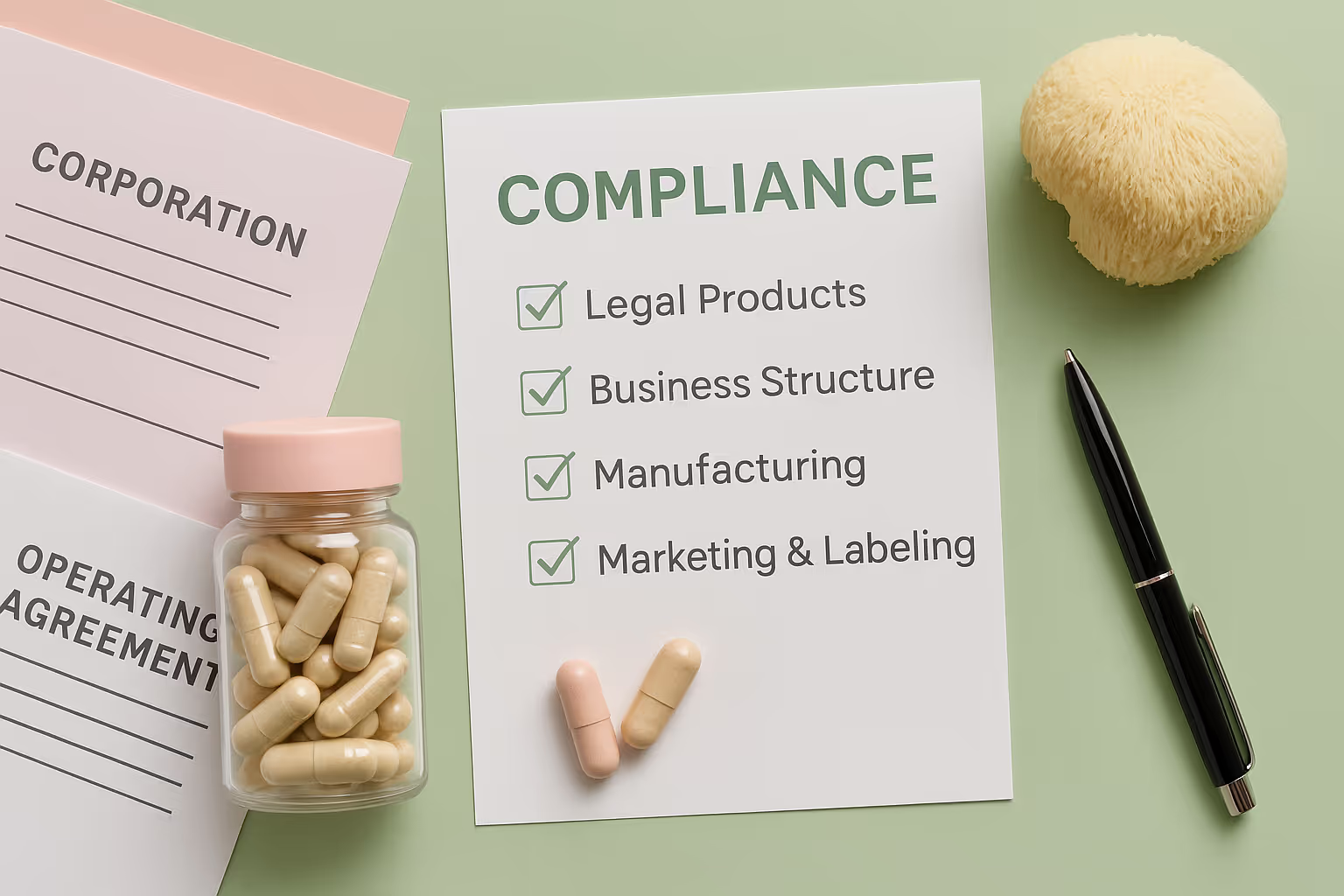
With the regulatory landscape understood, here's how to establish a legitimate nootropics business.
Choosing Legal Nootropic Products
Focus on products with a clear legal status:
- Research thoroughly: Investigate the regulatory status of each ingredient before including it in your product line.
- Start with established ingredients: Begin with well-known dietary supplement nootropics like Bacopa, L-Theanine, or Lion's Mane that have established safety records.
- Avoid gray areas: Until you have sophisticated legal counsel, avoid synthetic compounds with ambiguous regulatory status.
Many entrepreneurs find success by creating and growing a nootropics brand focused on natural, legally established ingredients rather than pushing regulatory boundaries.
Setting Up a Legal Business Structure
- Business Registration: Register your business as an LLC or corporation to provide personal liability protection.
- Business Licenses: Obtain necessary business licenses and permits for your jurisdiction.
- Insurance: Secure product liability insurance specifically covering dietary supplements.
Working with Reputable Manufacturers and Suppliers
Partner with established manufacturers who understand regulatory requirements:
- GMP Certification: Only work with manufacturers who have GMP certification.
- Third-Party Testing: Ensure your manufacturer conducts comprehensive testing for identity, purity, and potency.
- Supply Chain Verification: Verify the source and quality of all raw ingredients.
Private label supplements are another way for entrepreneurs to launch compliant nootropic products without handling manufacturing, testing, or shipping, eliminating many regulatory headaches associated with production.
Proper Marketing and Labeling Practices
To avoid regulatory issues:
- Compliant Claims: Make only structure/function claims that can be substantiated by scientific evidence.
- Disclaimer Requirements: Include the required FDA disclaimer: "These statements have not been evaluated by the Food and Drug Administration. This product is not intended to diagnose, treat, cure, or prevent any disease."
- Transparent Labeling: List all ingredients and their amounts.
- Avoid Problem Terms: Words like "cure," "treat," "prevent," and references to specific diseases should be avoided in all marketing materials.
Common Legal Pitfalls and How to Avoid Them
Even well-intentioned nootropics sellers can run into legal trouble. Here are common pitfalls and how to navigate them.
Marketing Claims Violations
The most frequent cause of FDA enforcement actions is improper marketing claims:
- Social Media Compliance: All claims on social media platforms, including customer testimonials you share, must adhere to the same standards as your product labels.
- Website Content: Blog posts, articles, and product descriptions should avoid connecting products to specific medical conditions.
- Implied Claims: Even indirect suggestions that products treat medical conditions can trigger enforcement.
Ingredient Compliance Issues
Be vigilant about ingredients:
- New Dietary Ingredient (NDI) Notifications: Ingredients not marketed before 1994 may require an NDI notification to the FDA.
- Banned Substances: Regularly check updated lists of prohibited ingredients from regulatory bodies.
- Adulteration: Ensure no prohibited pharmaceutical compounds are present in your products through comprehensive testing.
International Shipping Risks
Cross-border sales introduce additional complexities:
- Country-Specific Prohibited Lists: What's legal in your country may be illegal elsewhere.
- Customs Seizures: Products may be seized if they contain ingredients restricted in destination countries.
- Liability Exposure: Shipping prohibited substances internationally can result in significant legal penalties.
Building a Sustainable and Legal Nootropics Business
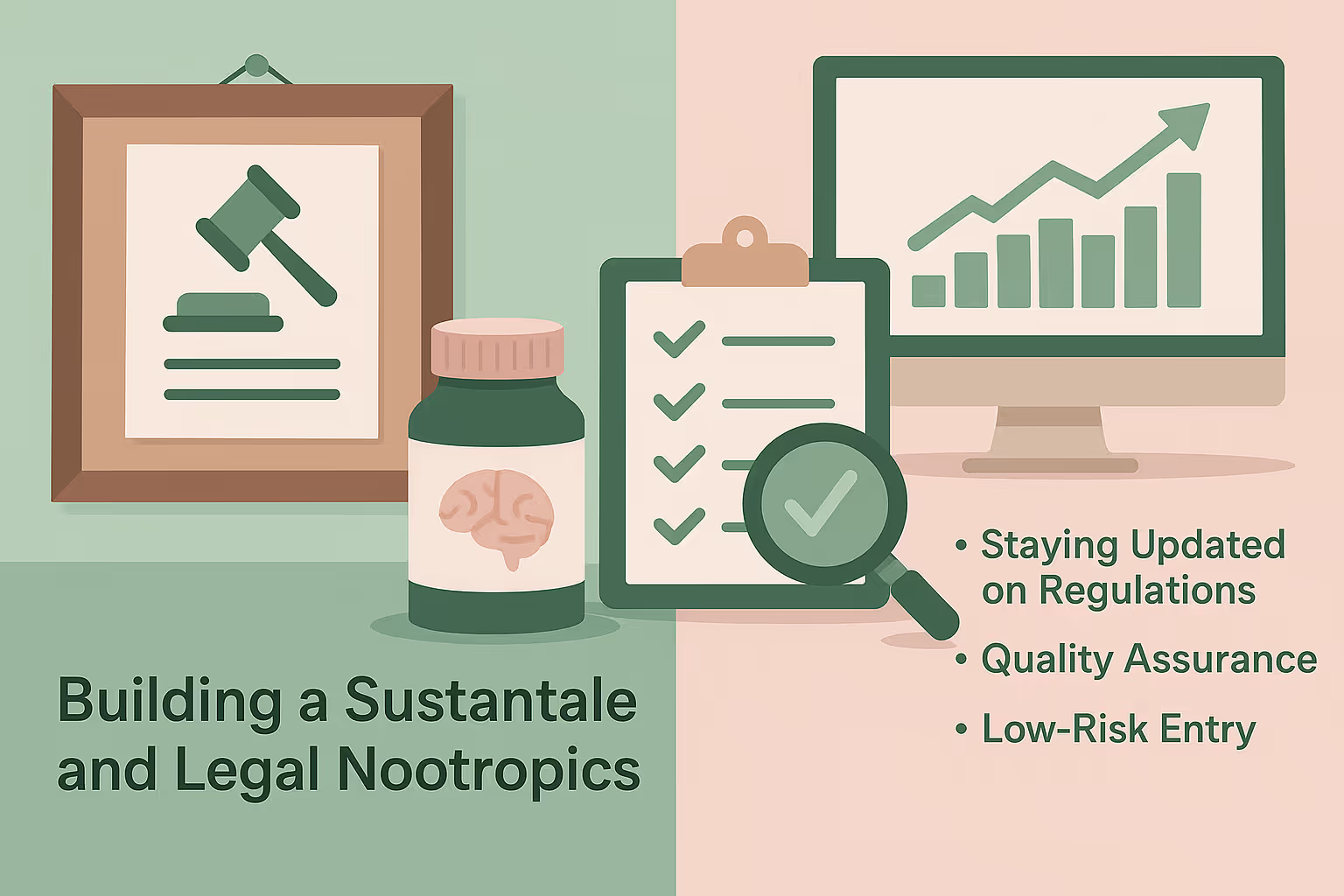
Success in the nootropics space requires a long-term approach focused on compliance and quality.
Staying Updated on Changing Regulations
The regulatory landscape for nootropics is constantly evolving:
- Industry Associations: Join supplement industry associations that provide regulatory updates.
- Legal Counsel: Establish a relationship with an attorney specializing in dietary supplement law.
- Regulatory Monitoring: Set up alerts for FDA announcements and warning letters in your category.
Implementing Quality Assurance Protocols
Build trust through rigorous quality standards:
- Comprehensive Testing Protocol: Test for identity, potency, heavy metals, microbiological contaminants, and residual solvents.
- Stability Testing: Ensure products maintain potency throughout their shelf life.
- Customer Feedback Systems: Implement processes to gather and respond to customer feedback about product effects.
Low-Risk Entry Strategies for New Entrepreneurs
For those new to the industry, consider these approaches:
- Private Label Products: Partner with established manufacturers offering nootropic products that already have regulatory compliance in place.
- Dropshipping Model: Start by selling nootropics online without inventory to test the market with a lower initial investment.
- Focus on Education: Build authority through educational content while selling well-established, legally clear products.
Expert Guidance: Use Regulatory Mapping Before Product Development
Compliance starts before formulation. Mapping each ingredient’s legal status across markets helps avoid delays, customs issues, and reformulations. It’s a smart way to protect your brand early. A small step now prevents major setbacks later.
The nootropics market hit $11.6 billion in 2022 and is set to reach $29.2 billion by 2030. Planning around FDA, EFSA, and TGA rules gives you a competitive edge. Global growth requires legal clarity. In this space, foresight drives success.
Taking Action: Your Path to a Legal Nootropics Business
The nootropics market offers strong potential for entrepreneurs who prioritize compliance. Success comes not from loopholes, but from building a sustainable, legally sound business.
Research the legal status of your products, seek expert regulatory counsel, and work with trusted manufacturers.
Focus your marketing on claims that are both compliant and science-backed. As demand for safe cognitive enhancers rises, brands that lead with integrity and compliance will thrive in this rapidly growing industry.
The information provided in this article is meant for general informational purposes only and should not be considered as professional or legal advice. We do not guarantee the completeness, accuracy, reliability, or suitability of the information in this article. We strongly recommend seeking professional guidance that suits your individual circumstances.
FAQ
Related blogs

Price Elasticity Of Demand Calculator: Predict Revenue Impact in Seconds
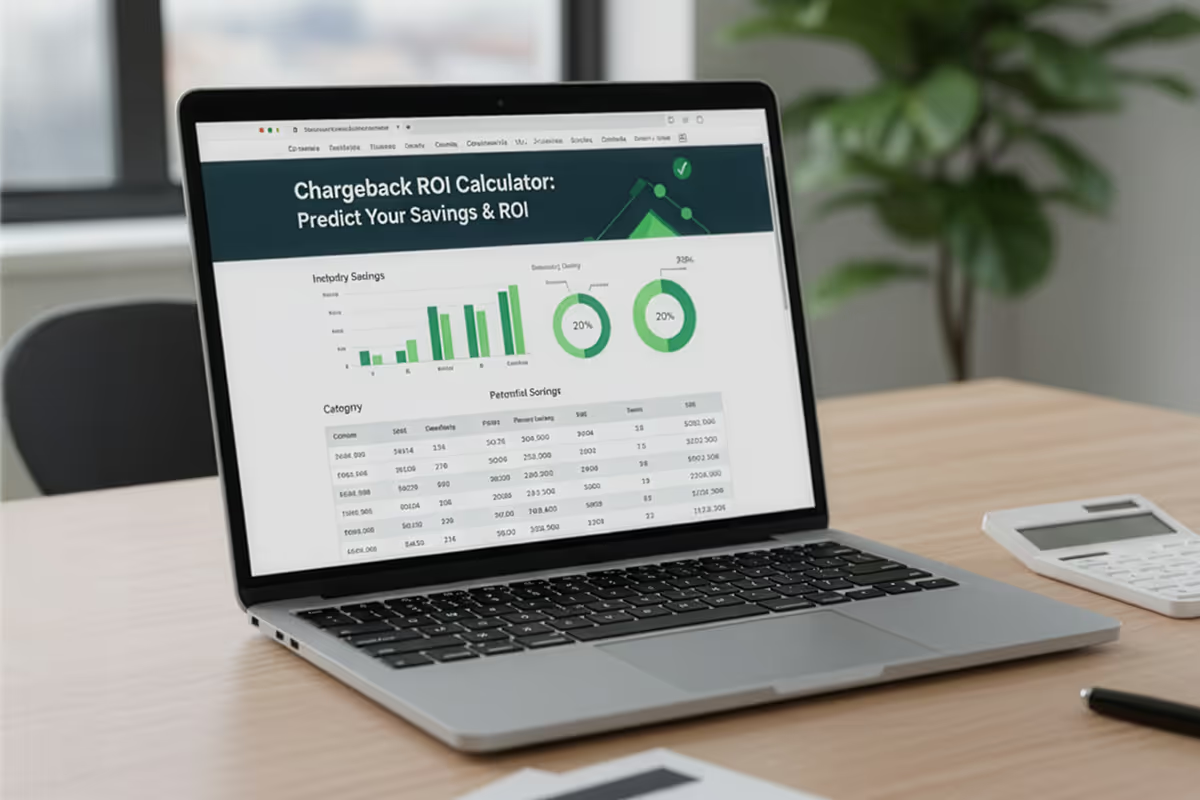
Chargeback ROI Calculator: Predict Your Savings and ROI in Under 10 Seconds
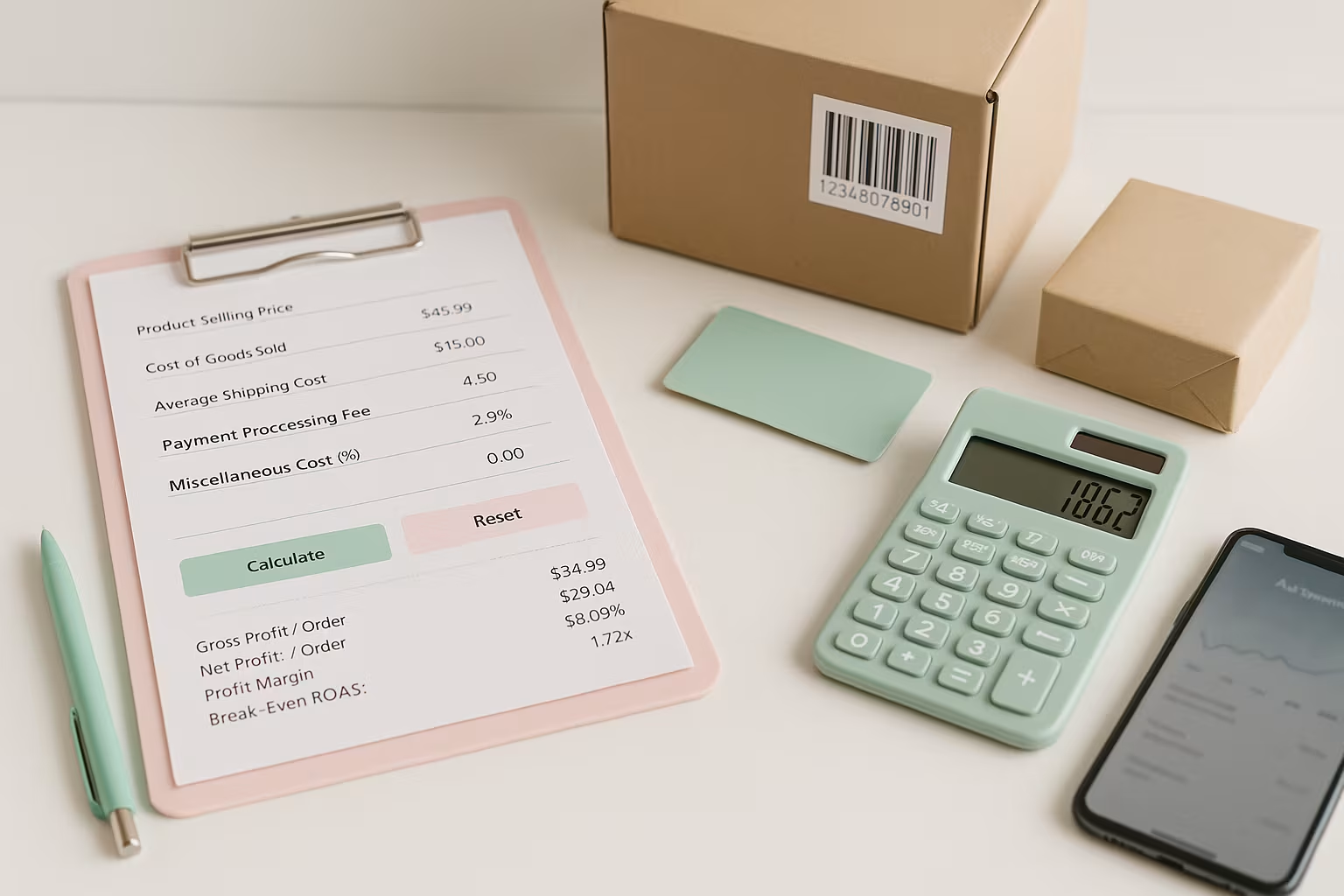
Break-Even ROAS Calculator: Find Out What You Can Afford to Spend on Ads
